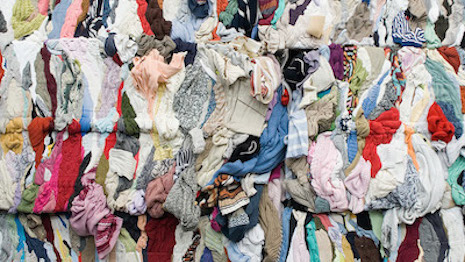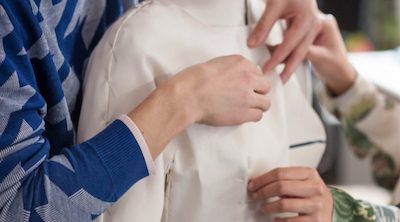 Kering-owned Stella McCartney uses sustainable fabric in its designs; Image courtesy of Stella McCartney
Kering-owned Stella McCartney uses sustainable fabric in its designs; Image courtesy of Stella McCartney
If the fashion industry continues to improve its environmental and social performance, approximately 160 billion euros, or $174 billion at current exchange rates, would be added to the global economy by 2030, according to a new report from Boston Consulting Group.
BCG’s first edition of the “Pulse of the Fashion Industry” report is in collaboration with the Global Fashion Agenda, a nonprofit initiative seeking to transform the way fashion is produced and consumed. The report is a temperature check of the fashion industry’s environmental and social performances, two concepts that are becoming increasingly important for consumers as they shop.
"According to the BCG 2015 Consumer Sentiment series, a third of millennials strongly agree that they are more likely to buy from companies that are mindful of their social responsibilities, while just a quarter of those older than 51 say so," said Sebastian Boger, principal at Boston Consulting Group, Munich. "However the increasing awareness is not yet necessarily translating into a willingness to pay more for sustainable products.
"In our Pulse Survey, the respondents rank 'low consumer willingness to pay a premium for sustainable products' as the number one barrier hindering companies from becoming more sustainable, environmentally, socially and ethically," he said. "Currently, 63 percent of companies do not charge any price premium for products explicitly marketed as sustainable."
The report’s findings will be presented May 11 during the Copenhagen Fashion Summit, organized annually by the Global Fashion Agenda.
Do-good fashion
BCG’s Pulse of the Fashion Industry drew from the Sustainable Apparel Coalition's Higg Index as well as a survey of more than 90 senior managers who work on sustainability issues within their companies.
"According to the managers polled, consumers have a clear role to play in moving the industry toward more sustainable business practices," BCG's Mr. Boger said. "Respondents view consumers as the third most influential stakeholder group in shaping companies' sustainability agendas, only outranked by policymakers/regulators and employees.
"Further sustainability managers view consumers as the group with the highest responsibility for driving the industry towards more sustainability," he said.
Although awareness is growing for sustainability and CSR efforts, the fashion industry scored low on the “Pulse Score,” a metric based on type of company, size, region and stage in the value chain. The Pulse Score is the first comprehensive scoring system to determine the health of the industry for sustainability performance.
The fashion industry only scored a 32 out of the possible 100 points.
Despite a low score, the fashion industry has made a lot of progress in the last decade. Many global fashion brands, including those in the luxury category, have developed employee policy and environmental strategies to become more sustainable and limit negative impact.
"The Pulse Score comprises a variety of fashion brands, including a broad selection of premium/luxury players ranging from 'upper middle premium bridge' to high-end luxury," Mr. Boger said.
 Sustainable fashion manufacturing will benefit the industry's overall value; Image courtesy of Kering
But, BCG stresses that more needs to be done and soon, because current product and consumption trajectories, paired with pressures of natural resources and social conditions, are set to continue. With matters intensifying by 2030, if fashion does not optimize its business practices to be sustainable, industry growth and profitability may suffer.
Per the report, apparel consumption is expected to increase by 63 percent to 102 million tons in 2030. This projected rise will increase fashion’s necessity to address environmental and social practices.
Also, if fashion improved on environmental and social performance, the sector’s commercial prospects would add 160 billion euros, or $174 billion at current exchange rates, to the global GDP.
While opportunity does exist, BCG found that even if the entire fashion industry implemented today’s best practices, capturing the $174 billion value and closing the gap would not be possible.
Work jointly for change
BCG notes that company size plays an important factor in Pulse Score. Larger companies show valiant efforts of environmental and CSR progress, and it is their size more than their price positioning driving performance.
France’s Kering Group is aiming to fast-track sustainable innovations in the luxury and apparel industries by becoming a founding anchor partner of Plug and Play -- Fashion for Good, an ideas accelerator.
Kering and its partners will work together to identify innovative startups and lend their support in terms of technologies, methodologies and business models.
Plug and Play -- Fashion for Good’s overall goal is to assist Kering and its brand stable to spark disruption innovations that will transform traditional luxury processes. Also, the innovations will further Kering’s commitment to the widespread adoption of sustainable business practices (see story).
Also, online retailer Yoox Net-A-Porter Group is setting sight on luxury retail’s future by voicing its responsibility and the opportunity its business has to empower and create a more sustainable tomorrow.
To bring its future vision to fruition, Yoox Net-A-Porter Group plans to lead by example by sharing its knowledge and making innovative headways in the luxury retail sector. Across the luxury landscape brands have been increasingly transparent regarding employee benefits, manufacturing processes and other corporate social responsibility touchpoints to demonstrate the industry's pioneering nature.
Sustainable fashion manufacturing will benefit the industry's overall value; Image courtesy of Kering
But, BCG stresses that more needs to be done and soon, because current product and consumption trajectories, paired with pressures of natural resources and social conditions, are set to continue. With matters intensifying by 2030, if fashion does not optimize its business practices to be sustainable, industry growth and profitability may suffer.
Per the report, apparel consumption is expected to increase by 63 percent to 102 million tons in 2030. This projected rise will increase fashion’s necessity to address environmental and social practices.
Also, if fashion improved on environmental and social performance, the sector’s commercial prospects would add 160 billion euros, or $174 billion at current exchange rates, to the global GDP.
While opportunity does exist, BCG found that even if the entire fashion industry implemented today’s best practices, capturing the $174 billion value and closing the gap would not be possible.
Work jointly for change
BCG notes that company size plays an important factor in Pulse Score. Larger companies show valiant efforts of environmental and CSR progress, and it is their size more than their price positioning driving performance.
France’s Kering Group is aiming to fast-track sustainable innovations in the luxury and apparel industries by becoming a founding anchor partner of Plug and Play -- Fashion for Good, an ideas accelerator.
Kering and its partners will work together to identify innovative startups and lend their support in terms of technologies, methodologies and business models.
Plug and Play -- Fashion for Good’s overall goal is to assist Kering and its brand stable to spark disruption innovations that will transform traditional luxury processes. Also, the innovations will further Kering’s commitment to the widespread adoption of sustainable business practices (see story).
Also, online retailer Yoox Net-A-Porter Group is setting sight on luxury retail’s future by voicing its responsibility and the opportunity its business has to empower and create a more sustainable tomorrow.
To bring its future vision to fruition, Yoox Net-A-Porter Group plans to lead by example by sharing its knowledge and making innovative headways in the luxury retail sector. Across the luxury landscape brands have been increasingly transparent regarding employee benefits, manufacturing processes and other corporate social responsibility touchpoints to demonstrate the industry's pioneering nature.
 Yoox Net-A-Porter Group pledges to minimize its environmental impact; Image courtesy of YNAP
Yoox Net-A-Porter’s sustainability pledge lies on three pillars: education, empowering women and responsibility (see story).
While these brand examples are facilitating industry change and bolstering innovation, it is the small and mid-size brands, who represent about half the market, that have created a “blind spot” for sustainable improvements.
Nonetheless, BCG and feels that collective industry-wide efforts, rather than fragmented action by individual brands, will fuel disrupting innovations. These sustainability innovations will not only support profits and growth, but also benefit society and the environment.
"If no action is taken, fashion brands will find themselves likely squeezed between falling average per-item-prices, deeper discount levels, rising costs and resource scarcity along the value chain," BCG's Mr. Boger said. "With resources becoming scarcer, the industry will face rising costs from labor to materials and energy. Based on conservative projections, fashion brands’ profitability levels are at risk in the range of at least 3 percentage points if they don’t act determinedly, and soon. If energy, water prices and labor costs grow strongly, the industry’s profitability will be over even more pressure.
"Second, from the perspective of regulators. According to industry experts there is a growing political will at least within the European Union to regulate the fashion industry," he said. "Initiatives in Germany, the Netherlands and elsewhere have gained momentum among policymakers in response to what they see as the industry’s lack of self-governance of supply chains
"Third, we looked at the consumer perspective. Until now, according to the Pulse Survey, consumers have shown limited willingness to pay a premium for sustainable products and limited awareness. However, with an expectation of increasing consumer awareness in the future, additional pressure from consumers is to be expected."
Yoox Net-A-Porter Group pledges to minimize its environmental impact; Image courtesy of YNAP
Yoox Net-A-Porter’s sustainability pledge lies on three pillars: education, empowering women and responsibility (see story).
While these brand examples are facilitating industry change and bolstering innovation, it is the small and mid-size brands, who represent about half the market, that have created a “blind spot” for sustainable improvements.
Nonetheless, BCG and feels that collective industry-wide efforts, rather than fragmented action by individual brands, will fuel disrupting innovations. These sustainability innovations will not only support profits and growth, but also benefit society and the environment.
"If no action is taken, fashion brands will find themselves likely squeezed between falling average per-item-prices, deeper discount levels, rising costs and resource scarcity along the value chain," BCG's Mr. Boger said. "With resources becoming scarcer, the industry will face rising costs from labor to materials and energy. Based on conservative projections, fashion brands’ profitability levels are at risk in the range of at least 3 percentage points if they don’t act determinedly, and soon. If energy, water prices and labor costs grow strongly, the industry’s profitability will be over even more pressure.
"Second, from the perspective of regulators. According to industry experts there is a growing political will at least within the European Union to regulate the fashion industry," he said. "Initiatives in Germany, the Netherlands and elsewhere have gained momentum among policymakers in response to what they see as the industry’s lack of self-governance of supply chains
"Third, we looked at the consumer perspective. Until now, according to the Pulse Survey, consumers have shown limited willingness to pay a premium for sustainable products and limited awareness. However, with an expectation of increasing consumer awareness in the future, additional pressure from consumers is to be expected."
